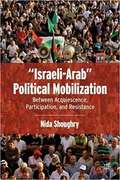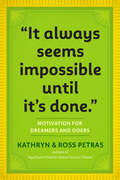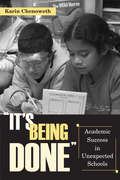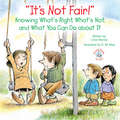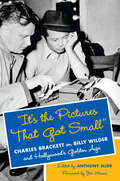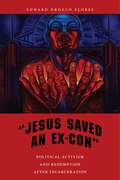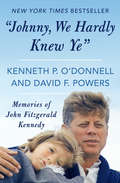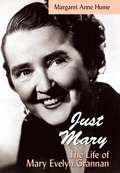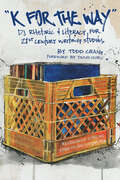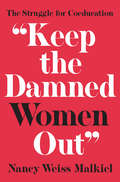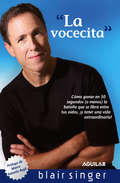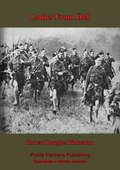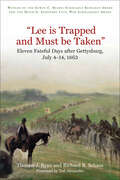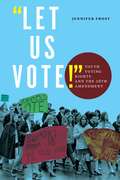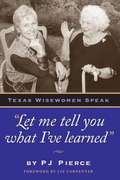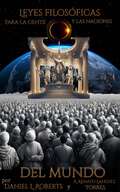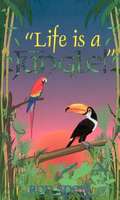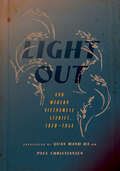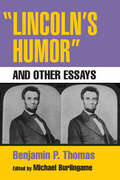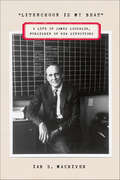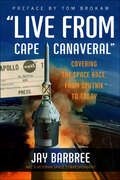- Table View
- List View
"Israeli-Arab" Political Mobilization: Between Acquiescence, Participation, and Resistance
by Nida Shoughry"Israeli-Arab" Political Mobilization: Between Acquiescence, Participation, and Resistance by Nida Shoughry.
"It Always Seems Impossible Until It's Done.": Motivation for Dreamers & Doers
by Ross Petras Kathryn PetrasPursuing a dream is hard work, but the right words delivered at the right time—by people who’ve been there and done that—can give us just the motivation we need. The right words can rekindle our enthusiasm, re-energize our efforts, dispel doubt, let us know we’re not alone, and show us that the fight is worth it—and winnable. Kathryn and Ross Petras are masters at choosing and delivering just the right words. Their books—such as “Age Doesn’t Matter Unless You’re a Cheese” and “Dance First. Think Later.”—and bestselling calendar, The 365 Stupidest Things Ever Said, have over 5.2 million copies in print. Now comes a book for dreamers and doers, plus writers, entrepreneurs, graduates, artists, future movers and shakers. Collecting the hard-won, brilliantly expressed advice from pioneers who have paved the way, including everyone from Rumi to Steve Jobs, Michelangelo to Oprah to Tina Fey, “It Always Seems Impossible Until It’s Done” is like a rousing locker-room speech, inspiring courage, commitment, and perseverance.“I’ve missed more than 9,000 shots in my career. I’ve lost almost 300 games. 26 times, I’ve been trusted to take the game-winning shot and missed. I’ve failed over and over and over again in my life. And that is why I succeed.” —Michael Jordan“Go for it, baby! Life ain’t no dress rehearsal.” —Tallulah Bankhead “Perfection is like chasing the horizon. Keep moving.” —Neil Gaiman“If you aren’t in over your head, how do you know how tall you are?” —T. S. Eliot“It always seems impossible until it’s done.” —Nelson Mandela
"It's Being Done": Academic Success in Unexpected Schools
by Karen Chenoweth Kati HaycockThis straightforward and inspiring book takes readers into schools where educators believe--and prove--that all children, even those considered "hard-to-teach," can learn to high standards. Their teachers and principals refuse to write them off and instead show how thoughtful instruction, high expectations, stubborn commitment, and careful consideration of each child's needs can result in remarkable improvements in student achievement.
"It's Being Done": Academic Success in Unexpected Schools
by Karen Chenoweth2007 Notable Education Book, American School Board Journal This straightforward and inspiring book takes readers into schools where educators believe—and prove—that all children, even those considered &“hard-to-teach,&” can learn to high standards. Their teachers and principals refuse to write them off and instead show how thoughtful instruction, high expectations, stubborn commitment, and careful consideration of each child&’s needs can result in remarkable improvements in student achievement.
"It's Not Fair!"
by R. W. Alley Linus MundyWhen it comes to fairness, every kid knows that a parent can't break a candy bar perfectly in half, for sharing. We grown-ups also know what it's like not being treated fairly, and we know that much unfairness springs from such things as greed, or hatred, or anger, or prejudice, or misunderstanding, or even from the ways of Nature. But using these "big words" to explain unfairness to children will probably not work. And so, in this book, author Linus Mundy, offers words and examples that children will understand and relate to. Our children are ready to understand more about this big, wide world we live in. And they are ready to make it better for everyone, by making it more just, more fair.
"It's the Pictures That Got Small": Charles Brackett on Billy Wilder and Hollywood's Golden Age (Film and Culture Series)
by Anthony SlideGolden Age Hollywood screenwriter Charles Brackett was an extremely observant and perceptive chronicler of the entertainment industry during its most exciting years. He is best remembered as the writing partner of director Billy Wilder, who once referred to the pair as "the happiest couple in Hollywood," collaborating on such classics as The Lost Weekend (1945) and Sunset Blvd (1950). In this annotated collection of writings taken from dozens of Brackett's unpublished diaries, leading film historian Anthony Slide clarifies Brackett's critical contribution to Wilder's films and Hollywood history while enriching our knowledge of Wilder's achievements in writing, direction, and style. Brackett's diaries re-create the initial meetings of the talent responsible for Ninotchka (1939), Hold Back the Dawn (1941), Ball of Fire (1941), The Major and the Minor (1942), Five Graves to Cairo (1943), The Lost Weekend, and Sunset Blvd, recounting the breakthrough and breakdowns that ultimately forced these collaborators to part ways. Brackett was also a producer, served as president of the Academy of Motion Picture Arts and Sciences and the Screen Writers Guild, was a drama critic for the New Yorker, and became a member of the exclusive literary club, the Algonquin Round Table. Slide provides a rare, front row seat to the Golden Age dealings of Paramount, Universal, MGM, and RKO and the innovations of legendary theater and literary figures, such as Alfred Lunt, Lynn Fontanne, Edna Ferber, and Dorothy Parker. Through Brackett's keen, witty perspective, the political and creative intrigue at the heart of Hollywood's most significant films comes alive, and readers will recognize their reach in the Hollywood industry today.
"It's the Pictures That Got Small": Charles Brackett on Billy Wilder and Hollywood's Golden Age (Film and Culture Series)
by Charles Brackett&“Brackett&’s diaries read like a funnier, better-paced version of Barton Fink.&” —Newsweek Screenwriter Charles Brackett is best remembered as the writing partner of director Billy Wilder, who once referred to the pair as &“the happiest couple in Hollywood,&” collaborating on such classics as The Lost Weekend and Sunset Boulevard. He was also a perceptive chronicler of the entertainment industry, and in this annotated collection of writings from dozens of Brackett&’s unpublished diaries, film historian Anthony Slide clarifies Brackett's critical contribution to Wilder&’s films and enriches our knowledge of Wilder&’s achievements in writing, direction, and style. Brackett&’s diaries re-create the initial meetings of the talent responsible for Ninotchka, Hold Back the Dawn, Ball of Fire, The Major and the Minor, Five Graves to Cairo, The Lost Weekend, and Sunset Boulevard, recounting the breakthroughs and the breakdowns that ultimately forced these collaborators to part ways. In addition to a portrait of Wilder, this is rare view of a producer who was a president of the Academy of Motion Picture Arts and Sciences and the Screen Writers Guild, a New Yorker drama critic, and a member of the Algonquin Round Table. With insight into the dealings of Paramount, Universal, MGM, and RKO, and legendary figures such as Alfred Lunt, Lynn Fontanne, Edna Ferber, and Dorothy Parker, this book reveals the political and creative intrigue at the heart of Hollywood&’s most significant films. &“A fascinating look at Hollywood in its classic period, and a unique and indispensable must-have for any movie buff.&” —Chicago Tribune &“This feels as close as we can get to being in the presence of Wilder&’s genius, and he emerges as the cruelest as well as the wittiest of men.&” —The Guardian &“Not only rare insight into their often-stormy partnership but also an insider&’s view of Hollywood during that era.&” —Los Angeles Times &“Very entertaining.&” —Library Journal
"Jesus Saved an Ex-Con": Political Activism and Redemption after Incarceration (Religion and Social Transformation #9)
by Edward Orozco FloresAn examination of the efforts of faith-based organizations to expand the rights of the formerly incarcerated The use of religion to rehabilitate and redeem formerly incarcerated individuals has been a cultural touchstone of the modern era. Yet religious outreach to those with criminal records has typically been associated with an emphasis on private spirituality, with efforts focused on repentance, conversion, and restorative justice. This book sheds light on how faith-based organizations utilize the public arena, mobilizing to expand the social and political rights of former inmates. In “Jesus Saved an Ex-Con,” Edward Orozco Flores profiles Community Renewal Society and LA Voice, two faith-based organizations which have actively waged community organizing campaigns to expand the rights of people with records. He illuminates how these groups help the formerly incarcerated re-enter broader communities through the expansion of citizenship rights and participation in civic engagement. Most work on prisoner reentry has focused on how the behavior of those with records may be changed through interventions, rather than considering how those with records may change the society that receives them. Flores explores how the formerly incarcerated use redemption scripts to participate in civic engagement, to remove the felony conviction question from employment applications and to restrict the use of criminal background checks in housing and employment. He shows that people with records can redeem themselves while also challenging and changing the way society receives them.
"Johnny, We Hardly Knew Ye": Memories of John Fitzgerald Kennedy
by David F. Powers Kenneth P. O'DonnellThis classic New York Times bestseller is an illuminating portrait of JFK—from his thrilling rise to his tragic fall—by two of the men who knew him best. As a politician, John Fitzgerald Kennedy crafted a persona that fascinated and inspired millions—and left an outsize legacy in the wake of his murder on November 22, 1963. But only a select few were privy to the complicated man behind the Camelot image. Two such confidants were Kenneth P. O&’Donnell, Kennedy&’s top political aide, and David F. Powers, a special assistant in the White House. They were among the president&’s closest friends, part of an exclusive inner circle that came to be known as the &“Irish Mafia.&” In Johnny, We Hardly Knew Ye, O&’Donnell and Powers share memories of Kennedy, his extraordinary political career, and his iconic family—memories that could come only from intimate access to the man himself. As they recount the full scope of Kennedy&’s journey—from his charismatic first campaign for Congress to his rapid rise to national standing, culminating on that haunting day in Dallas—O&’Donnell and Powers lay bare the inner workings of a leader who is cherished and mourned to this day, in a memoir that spent over five months on the New York Times bestseller list.
"Just Mary": The Life of Mary Evelyn Grannan
by Margaret Anne HumeJust Mary and Maggie Muggins are names that will arouse memories in those who grew up with CBC radio and television in the 1940s and 1950s. The creator of these and other children’s shows, former Fredericton schoolteacher Mary Grannan, became a radio star when she hit the national airwaves in 1939, her popularity peaking when Maggie Muggins moved to television in 1955. Long before The Friendly Giant and Mr. Dressup appeared, her work helped to shape the legacy of gentle children’s programming on CBC. Building on her broadcasting success, Grannan published over thirty books, most runaway best-sellers. Attired in stylish dress, extravagant hats, and enormous earrings, she made frequent guest appearances at public events across the country. She received the Beaver Award for her broadcasting and was honoured by the International Mark Twain Society and the Institute for Education by Radio at Ohio State University."Just Mary": The Life of Mary Evelyn Grannan is the first biography of this creative and once well-known Canadian woman. Immersing the reader in rich detail while showcasing excerpts of her writings through the years, the book presents an intimate examination of her life journey through previously unreleased personal letters, archives, an abundance of photographs, and interviews with family, friends, colleagues, and former students. This is the private Mary Grannan as the public has never before known her.
"K for the Way": DJ Rhetoric and Literacy for 21st Century Writing Studies
by Todd Craig“K for the Way” explores writing, rhetoric, and literacy from the perspective of the Hip Hop DJ. Todd Craig, a DJ himself, establishes and investigates the function of DJ rhetoric and literacy, illuminating the DJ as a fruitful example for (re)envisioning approaches to writing, research, and analysis in contemporary educational settings. Because it is widely recognized that the DJ was the catalyst for the creation of Hip Hop culture, this book begins a new conversation in which Hip Hop DJs introduce ideas about poetics and language formation through the modes, practices, and techniques they engage in on a daily basis. Using material from a larger qualitative research study that illustrates the Hip Hop DJ as a twenty-first-century new media reader, writer, and literary critic, Craig blends interviews from prominent and influential DJs in the Hip Hop community with narrative and interdisciplinary scholarship from writing studies, Hip Hop studies, African American studies, urban education, and ethnomusicology. The voices of DJs sit front and center, presenting a revolutionary conversation about writing and communication in the twenty-first century. Weaving Craig’s life experiences with important discussions of racial literacies, “K for the Way” is a layered and utterly singular exploration of culture, identity, and literacy in America.
"Keep the Damned Women Out": The Struggle for Coeducation (The William G. Bowen Memorial Series in Higher Education)
by Nancy Weiss MalkielAs the tumultuous decade of the 1960s ended, a number of very traditional, very conservative, highly prestigious colleges and universities in the United States and the United Kingdom decided to go coed, seemingly all at once, in a remarkably brief span of time. Coeducation met with fierce resistance. As one alumnus put it in a letter to his alma mater, "Keep the damned women out." Focusing on the complexities of institutional decision making, this book tells the story of this momentous era in higher education--revealing how coeducation was achieved not by organized efforts of women activists, but through strategic decisions made by powerful men.In America, Ivy League schools like Harvard, Yale, Princeton, and Dartmouth began to admit women; in Britain, several of the men's colleges at Cambridge and Oxford did the same. What prompted such fundamental change? How was coeducation accomplished in the face of such strong opposition? How well was it implemented? Nancy Weiss Malkiel explains that elite institutions embarked on coeducation not as a moral imperative but as a self-interested means of maintaining a first-rate applicant pool. She explores the challenges of planning for the academic and non-academic lives of newly admitted women, and shows how, with the exception of Mary Ingraham Bunting at Radcliffe, every decision maker leading the charge for coeducation was male.Drawing on unprecedented archival research, "Keep the Damned Women Out" is a breathtaking work of scholarship that is certain to be the definitive book on the subject.
"La vocecita"
by Blair Singer"The "Little Voice" lives in that short six inch span between your right ear and your left ear. What's awesome is you can master it in 30 seconds or less and have an extraordinary life. " "This book de-bunks much of the popular thought about personal growth and gets you down and dirty with real-world, right-now techniques that will help you make profound changes in your life immediately. " -Blair Singer "Little Voice" mastery will give you the ability to: -Maintain your power in any pressure situation. -Stop the debilitating chatter in your brain so you can attract what you want now. -Uncover and realize your lifelong dreams. -Break through self sabotaging habits. -Build powerful lasting confidence. -Resurrect the hero inside of you. -Embody 21 proven techniques to re-programming the Little Voice in your brain in 30 seconds.
"Ladies From Hell,"
by Robert Douglas Pinkerton"With the London-Scottish Regiment During the First World WarThe 'Cockney Jocks' at war in Flanders and FranceThe wide distribution of Scots throughout Britain and the Empire led to the formation new 'Scottish' regiments and the London Scottish, formed in 1859 as a volunteer rifle corps and originally commanded by Lord Elcho, was a primary example. Elcho, anxious to embrace all the fighting men of Scotland into one brotherhood irrespective of their clan origins, uniquely clad the regiment in kilts of 'Hodden Grey,' a traditional hard wearing Scottish homespun cloth devoid of the tartan check and, as he perceived, being a drab colour suited for life on military campaign in the most practical way. Pinkerton, the author of this book was a soldier among the ranks of the regiment who answered the nation's call to arms during the First World War. The regiment was mobilised at the outbreak of hostilities and the 1st battalion had the distinction of being the first Territorials to go into action during operations at Messines in October 1914. Pinkerton takes his readers to war with the London Scottish on the western front where it took part in all the major offensives of the conflict. Predictably this vital account is filled with immediate first hand account action and anecdotes and is essential reading for anyone interested in the war in the trenches the kilted infantry knew."-Leonaur Print VersionAuthor -- Pinkerton, Robert Douglas.Text taken, whole and complete, from the edition published in New York, The Century co., 1918.Original Page Count - 254 pages.
"Lee is Trapped, and Must be Taken": Eleven Fateful Days after Gettysburg, July 4–14, 1863
by Thomas J. Ryan Richard R. SchausThousands of books and articles examine nearly every aspect of the Civil War, but the important retreat of the armies from the Gettysburg battlefield to the Potomac River has been but little covered. Until now, no one had produced a critical analysis of the command decisions made during that fateful time based upon available intelligence. “Lee is Trapped and Must be Taken”: Eleven Fateful Days after Gettysburg, July 4 to July 14, 1863, by Thomas J. Ryan and Richard R. Schaus, now available in paperback, rectifies this oversight. This comprehensive day-by-day account, which begins after the end of the Gettysburg battle, examines how Maj. Gen. George G. Meade organized and motivated his Army of the Potomac in response to President Abraham Lincoln’s mandate to bring about the “literal or substantial destruction” of Gen. Robert E. Lee’s defeated and retreating Army of Northern Virginia. As far as Lincoln was concerned, if Meade aggressively pursued and confronted Lee before he could escape across the flooded Potomac River, “the rebellion would be over.” The long and bloody three-day battle exhausted both armies. Both commanders faced the difficult tasks of rallying their troops for more marching and fighting. Lee had to keep his army organized and motivated enough to conduct an orderly withdrawal into Virginia. Meade faced the same organizational and motivational challenges with the added expectation of catching and defeating a still-dangerous enemy. Central to their decision-making was the information they received from their intelligence gathering resources about the movements, intentions, and capability of the enemy. The eleven-day period after Gettysburg was a battle of wits to determine which commander better understood the information he received and directed his army accordingly. Prepare for some surprising revelations. Ryan and Schaus rely on a host of primary sources to craft their study, including letters, memoirs, diaries, official reports, newspapers, and telegrams. The threading of these intelligence gems creates a gripping narrative with a significant amount of new information—which the authors use to offer their own direct and often damning conclusions. “Lee is Trapped and Must be Taken” is a sequel to Thomas Ryan’s Spies, Scouts, and Secrets in the Gettysburg Campaign (Savas Beatie, 2015), the recipient of the Bachelder-Coddington Literary Award and Gettysburg Civil War Round Table Distinguished Book Award.
"Left-Wing" Communism, an Infantile Disorder
by V. I. LeninThis book describes the influence of left-wing Communism in different countries.
"Let Us Vote!": Youth Voting Rights and the 26th Amendment
by Jennifer FrostThe fascinating tale of how a bipartisan coalition worked successfully to lower the voting age“Let Us Vote!” tells the story of the multifaceted endeavor to achieve youth voting rights in the United States. Over a thirty-year period starting during World War II, Americans, old and young, Democrat and Republican, in politics and culture, built a movement for the 26th Amendment to the US Constitution, which lowered the voting age from twenty-one to eighteen in 1971. This was the last time that the United States significantly expanded voting rights.Jennifer Frost deftly illustrates how the political and social movements of the time brought together bipartisan groups to work tirelessly in pursuit of a lower voting age. In turn, she illuminates the process of achieving political change, with the convergence of “top-down” initiatives and “bottom-up” mobilization, coalition-building, and strategic flexibility. As she traces the progress toward achieving youth suffrage throughout the ’60s, Frost reveals how this movement built upon the social justice initiatives of the decade and was deeply indebted to the fight for African American civil and voting rights.2021 marks the fiftieth anniversary of this important constitutional amendment and comes at a time when scrutiny of both voting age and voting rights has been renewed. As the national conversation around climate crisis, gun violence, and police brutality creates a new call for a lower voting age, “Let Us Vote!” provides an essential investigation of how this massive political change occurred, and how it could be brought about again.
"Let me tell you what I've learned:" Texas Wisewomen Speak
by Pj PierceBarbara Jordan spoke for many Texas women when she told a reporter, "I get from the soil and spirit of Texas the feeling that I, as an individual, can accomplish whatever I want to, and that there are no limits, that you can just keep going, just keep soaring. I like that spirit." Indeed, the sense of limitless possibilities has inspired countless Texas women—sometimes in the face of daunting obstacles—to build lives rich in work, family, friends, faith, and community involvement.
"Leyes filosóficas para la gente y las naciones del mundo.": "Explorando el Impacto de la Filosofía en la Legislación Global"
by Daniel L. Roberts1. Propuesta de Ley de Conservación: Se propone una ley que destine estímulos económicos del gobierno federal para invertir en proyectos de conservación, como la siembra de nubes y la reforestación, con el fin de combatir el calentamiento global y restaurar el suministro de agua. 2. Análisis sobre la Siembra de Nubes:Se discute cómo la modificación de los patrones climáticos afecta la formación de tormentas y se propone el uso de la siembra de nubes para restaurar los ciclos pluviales y combatir la sequía. 3. Propuesta de Ley de Solución Momentánea: Se presenta una ley que busca utilizar fondos federales para incentivar la adopción y reducir la tasa de natalidad, así como promover prácticas de construcción sostenible y reforestación para combatir el cambio climático. 4. Propuesta de Ley de Libertad de Aprendizaje:Se propone una legislación que brinde a los estudiantes la opción de asistir a la escuela solo dos días a la semana y dedicar el resto del tiempo a la educación en el hogar o el aprendizaje en línea, con el objetivo de proporcionar un entorno educativo más flexible y adaptado a las necesidades individuales de los estudiantes. En general, los textos abordan una variedad de temas, desde la conservación ambiental hasta la educación y la filosofía, con el objetivo común de proponer soluciones innovadoras para los desafíos actuales que enfrenta la sociedad.
"Life Doesn't Wait": Romania’s Failure to Protect and Support Children and Youth Living with HIV
by Human Rights WatchMore than 7,200 Romanian children and youth aged 15 to 19 are living with HIV. The vast majority were infected with HIV between 1986 and 1991 as a direct result of government policies that exposed them to contaminated needles and "microtransfusions" in which small children were injected with unscreened blood in the mistaken belief that this would improve their health.
"Life Is a Jungle" (Book 2: The Rani Adventures)
by Ron SnellIn this delightfully written book, Ron continues his memoir. His parents are Wycliffe translators, who live much as the Machiguenga do. Ron spends much of his time with his Peruvian Indian friends, helping with projects, which often leads to fascinating and hilarious adventures. Ron loves this life, and he writes with a warmth and cleverness that makes this book hard to put down. The other books in this series are available from Bookshare.
"Light Out" and Modern Vietnamese Stories, 1930–1954 (NIU Southeast Asian Series)
by Paul Christiansen Quan Manh Ha"Light Out" and Modern Vietnamese Stories, 1930–1954, translated by Quan Manh Ha and Paul Christiansen, with an essay by Ngô Văn Giá, is the first anthology in English of colonial Vietnamese literature written by canonical authors. Light Out depicts colonial exploitation, impoverished peasants at the mercy of precarious crop cycles, and institutionalized corruption that pits peasants against village officials. Set over the course of a few days, the novella presents an intimate look into the rural society in northern Vietnam during the height of French colonialism, exposing the brutal realities of the period and the impact such deprivations have on the human spirit. The eighteen short stories included in this book thematically delineate colonial abuses, class discrimination, patriarchal expectations, and livelihoods tethered to an unstable environment. Aesthetically, they illuminate the impact of French literary traditions and Western thought on Vietnamese traditions of storytelling.
"Lincoln's Humor" and Other Essays
by Benjamin P. ThomasThis volume gathers the best previously unpublished and uncollected writings on Abraham Lincoln and Lincoln scholarship by one of his great biographers, Benjamin P. Thomas. A skilled historian and a masterful storyteller himself, Thomas was widely regarded as the greatest Lincoln historian of his generation. With these essays, he combines historical depth with narrative grace in delineating Lincoln's qualities as a humorist, lawyer, and politician. From colorful tall tales to clever barbs aimed at political opponents, Lincoln clothed a shrewd wit in a homespun, backwoods vernacular. He used humor to defuse tension, illuminate a point, put others at ease--and sometimes for sheer fun. From an early reliance on broad humor and ridicule in speeches and on the stump, Lincoln's style shifted in 1854 to a more serious vein in which humor came primarily to elucidate an argument. "If I did not laugh occasionally I should die," he is said to have told his cabinet, "and you need this medicine as much as I do." Thomas brings his deep knowledge of Lincoln to essays on the great man's tumultuous career in Congress, his work as a lawyer, his experiences in the Courts, and his opinions of the South. A gracious survey of Lincoln's early biographers, particularly Ida Tarbell, stands alongside an appreciation of Harry Edward Pratt, a key figure in the early days of the Abraham Lincoln Association. Thomas also assesses Lincoln's use of language and the ongoing significance of the Gettysburg Address. This diverse collection is enhanced by an introduction by Michael Burlingame, himself a leading biographer of Lincoln. Burlingame provides a balanced portrait of Thomas and his circuitous path toward writing history.
"Literchoor Is My Beat": A Life of James Laughlin, Publisher of New Directions
by Ian S. MacNivenA biography—thoughtful and playful—of the man who founded New Directions and transformed American publishingJames Laughlin—poet, publisher, world-class skier—was the man behind some of the most daring, revolutionary works in verse and prose of the twentieth century. As the founder of New Directions, he published Ezra Pound's The Cantos and William Carlos Williams's Paterson; he brought Hermann Hesse and Jorge Luis Borges to an American audience. Throughout his life, this tall, charismatic intellectual, athlete, and entrepreneur preferred to stay hidden. But no longer—in "Literchoor Is My Beat": A Life of James Laughlin, Publisher of New Directions, Ian S. MacNiven has given us a sensitive and revealing portrait of this visionary and the understory of the last century of American letters. Laughlin—or J, as MacNiven calls him—emerges as an impressive and complex figure: energetic, idealistic, and hardworking, but also plagued by doubts—not about his ability to identify and nurture talent but about his own worth as a writer. Haunted by his father's struggles with bipolar disorder, J threw himself into a flurry of activity, pulling together the first New Directions anthology before he'd graduated from Harvard and purchasing and managing a ski resort in Utah. MacNiven's portrait is comprehensive and vital, spiced with Ezra Pound's eccentric letters, J's romantic foibles, and anecdotes from a seat-of-your-pants era of publishing now gone by. A story about the struggle to publish only the best, it is itself an example of literary biography at its finest.
"Live from Cape Canaveral": Covering the Space Race, from Sputnik to Today
by Jay Barbree“From Sputnik to the International Space Station, Jay Barbree has seen it all, and reported it well. ‘Live from Cape Canaveral’ encapsulates the most technically exciting half century in history.” –Neil ArmstrongSome fifty years ago, while a cub reporter, Jay Barbree caught space fever the night that Sputnik passed over Georgia. He moved to the then-sleepy village of Cocoa Beach, Florida, right outside Cape Canaveral, and began reporting on rockets that fizzled as often as they soared. In "Live from Cape Canaveral," Barbree—the only reporter who has covered every mission flown by astronauts—offers his unique perspective on the space program. He shares affectionate portraits of astronauts as well as some of his fellow journalists and tells some very funny behind-the-scenes stories—many involving astronaut pranks. Barbree also shows how much the space program and its press coverage have changed over time. Warm and perceptive, he reminds us just how thrilling the great moments of the space race were and why America fell in love with its heroic, sometimes larger-than-life astronauts.
